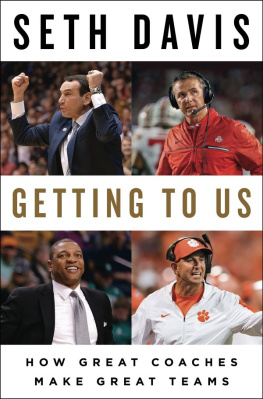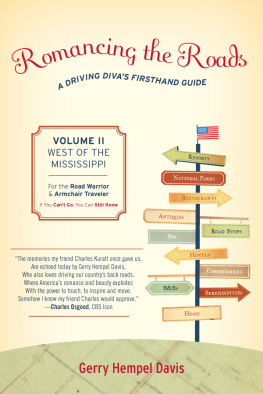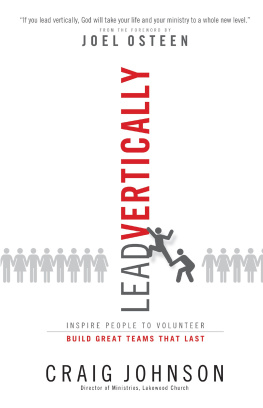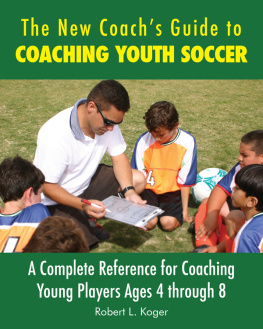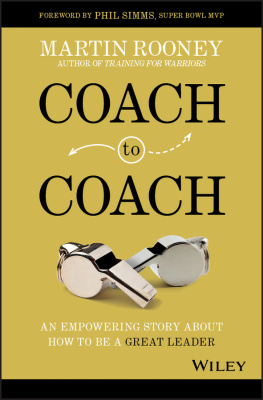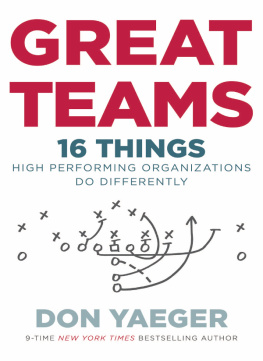Davis - Getting to Us: How Great Coaches Make Great Teams
Here you can read online Davis - Getting to Us: How Great Coaches Make Great Teams full text of the book (entire story) in english for free. Download pdf and epub, get meaning, cover and reviews about this ebook. year: 2018, publisher: Penguin Group US, genre: Detective and thriller. Description of the work, (preface) as well as reviews are available. Best literature library LitArk.com created for fans of good reading and offers a wide selection of genres:
Romance novel
Science fiction
Adventure
Detective
Science
History
Home and family
Prose
Art
Politics
Computer
Non-fiction
Religion
Business
Children
Humor
Choose a favorite category and find really read worthwhile books. Enjoy immersion in the world of imagination, feel the emotions of the characters or learn something new for yourself, make an fascinating discovery.
- Book:Getting to Us: How Great Coaches Make Great Teams
- Author:
- Publisher:Penguin Group US
- Genre:
- Year:2018
- Rating:4 / 5
- Favourites:Add to favourites
- Your mark:
- 80
- 1
- 2
- 3
- 4
- 5
Getting to Us: How Great Coaches Make Great Teams: summary, description and annotation
We offer to read an annotation, description, summary or preface (depends on what the author of the book "Getting to Us: How Great Coaches Make Great Teams" wrote himself). If you haven't found the necessary information about the book — write in the comments, we will try to find it.
Davis: author's other books
Who wrote Getting to Us: How Great Coaches Make Great Teams? Find out the surname, the name of the author of the book and a list of all author's works by series.
Getting to Us: How Great Coaches Make Great Teams — read online for free the complete book (whole text) full work
Below is the text of the book, divided by pages. System saving the place of the last page read, allows you to conveniently read the book "Getting to Us: How Great Coaches Make Great Teams" online for free, without having to search again every time where you left off. Put a bookmark, and you can go to the page where you finished reading at any time.
Font size:
Interval:
Bookmark:
Equinunk, Tell Your Story: My Return to Summer Camp
When March Went Mad: The Game That Transformed Basketball
Wooden: A Coachs Life

PENGUIN PRESS
An imprint of Penguin Random House LLC
375 Hudson Street
New York, New York 10014
penguin.com
Copyright 2018 by Seth Davis
Penguin supports copyright. Copyright fuels creativity, encourages diverse voices, promotes free speech, and creates a vibrant culture. Thank you for buying an authorized edition of this book and for complying with copyright laws by not reproducing, scanning, or distributing any part of it in any form without permission. You are supporting writers and allowing Penguin to continue to publish books for every reader.
ISBN 9780735222724 (hardcover)
ISBN 9780735222731 (ebook)
Version_1
For my home team
Melissa, Zachary, Noah, Gabriel, and Clarence
Foolish is the appropriate word.
I like smelling my neighbors cookout.
I believe in ethnic pressure.
People can work with the truth.
Its all about losing.
Women take all the credit, trust me.
You can get a great speech from a therapist.
All the good ones want to be coached.
God never says, Oops.
A man paces the sidelines, arms folded, jaw set, eyes ablaze. Wheels turn in his mind, stress rips up his gut. He stomps, he gesticulates, he barks orders, he bitches at referees. In preparation for this moment, he hires a staff, chooses his roster, devises game plans, studies video, makes substitutions, diagrams plays, perorates in the locker room, builds a culture.
And his teams win. Not always, for even the greatest of coaching minds cannot avoid losses. Over time, however, his excellence shines through, not so much because of anything he himself does, but because of the mysterious process by which he is able to stir his players to reach their potential as individuals and as a unit, a team. It is a delicate task, requiring an ability to set standards and apply them, and to manage a diverse group of egos. A team begins as a collection of mes, hims, and yous. It is the job of the coach to figure out a way to get to Us.
It is not easy to do, nor is it easily explained.
During my quarter century as a journalist working for outlets like Sports Illustrated, CBS Sports, and The Athletic, I have had the privilege of observing from close range many of the greatest coaches in sports, particularly in football and basketball. I have been to their games, sat in on their meetings and practices, interviewed them at length in private settings. Ive found many athletes intensely interesting. But when it comes to fascinating characters, there is nothing like highly successful coaches. They are a writers dreammultihued, paradoxical characters, by turns brilliant, driven, tortured, compulsive, and philosophical. By rule, seemingly, they are all at least a little bit weird. They are laser-focused yet absentminded. They are often gratified, but rarely do I get the sense that they are deeply, truly happy.
My desire to demystify this vocation was what inspired me to write this book. The intent here is not to add to what is commonly referred to as the cult of the coach. There is already more than enough idolatry in our sporting culture. These are men, not gods, and they will be the first to tell you that much of their success is rooted in the good fortune to coach great players at great organizations or universities. My purpose is simply to examine these men in the hope of figuring out how they get to Us. I set out to trace their steps, all the way back to their early years, in hopes of developing an understanding of the forces that have formed their character and taught them the skills they apply to their craft. I didnt want just to assess their leadership methods, though I did learn a lot about how they go about their jobs. I also wanted to know why they go about their jobs.
You will find in these portraits a wide variety of life experiences and leadership philosophies. However, I have isolated four personal qualities that I believe to be the core requirements all great coaches must have in order to get a group of individuals to Us. They form what I call the PEAK profile:
Persistence. We all know that great coaches are passionate and competitive. They burn with intensity. Many look for perceived slights or contrived conspiracies to provide extra motivation. But those forces are ephemeral. Persistence is the strain of character one leans upon during those quiet moments when self-doubt creeps in. It is both tested and manufactured during childhood and early-adulthood adversity. It is evinced in the day-to-day mundane routines, the unglamorous aspects that make up the bulk of the time spent on the job. Those tasks are performed in solitude when the fans are gone and the cameras are nowhere in sight. Yet they are vital. It takes persistence to get them done, and done right.
What I learned is that if a coach lacks sufficient persistence, he will be unable to complete the critical task of finding growth opportunities out of adversity. If the setbacks do not enable him to mature and learn, he will ultimately fail. More important, he will be unable to persuade his players to cohere during the tough times. Persistence is the mortar that holds the bricks together when the high winds blow. Without it, the ethos of Us will collapse against the force of high-level competition.
Empathy. It is important to understand the difference between sympathy and empathy. Sympathy involves feeling sad for another persons dire condition. Empathy requires feeling whatever that person is feeling. And so a great coach must find ways to learn about his players, taking time to acquire the critical information that will lead him to understand how the players mind, heart, and guts operate.
If I were ranking the PEAK qualities in order of importance, empathy would come first. Like snowflakes, no two athletes are alike. The one thing that great coaches have most in common is the ability to discern the different ways to motivate each guy. Some players need a soft touch. Others need a firm kick. All have individual goalsand they are entitled to thatso a coach cannot get them to Us unless he can persuade them to act in a way that serves the teams best interests as well as their own. Empathy is an indispensable trait in great leaders. There is no getting to Us without it.
Authenticity. Some coaches scream a lot, berate their players, and are unable to get through a declarative sentence without profanity. Others are quiet, reserved, maybe a little pious. In the end, it doesnt matter what they believe or how they behave. What matters is that they remain true to themselves and act accordingly.
Tom Izzo and Dabo Swinney are as congenial as it gets. Jim Boeheim and Urban Meyer tend to be standoffish, and they can be real tools when they want to be. Jim Harbaugh is a raving maniac on the sideline. Brad Stevens barely has a pulse. What makes them great coaches is their refusal to be something theyre not. Players can spot a phony in an instant. Trust may be an important component in any team, but there is no trust without authenticity. The guys on the team must have full confidence that their coach will remain authentic, particularly in those critical moments when the team must function as a single unit or suffer defeat.
Moreover, authenticity plays a part in every decision a coach makes, and that includes the type of system he wants to run. Far too often, our assessment of a coachs performance centers on game strategy. It is more important for the coach to recognize his own strengths and weaknesses, and acknowledge that they often come from the same place. Only then can he build a system that best suits his skill set and personality profile. His players will execute their tasks as long as they know he will never deviate from his fundamental belief set. That authenticity must be on display every hour of every day.
Font size:
Interval:
Bookmark:
Similar books «Getting to Us: How Great Coaches Make Great Teams»
Look at similar books to Getting to Us: How Great Coaches Make Great Teams. We have selected literature similar in name and meaning in the hope of providing readers with more options to find new, interesting, not yet read works.
Discussion, reviews of the book Getting to Us: How Great Coaches Make Great Teams and just readers' own opinions. Leave your comments, write what you think about the work, its meaning or the main characters. Specify what exactly you liked and what you didn't like, and why you think so.

